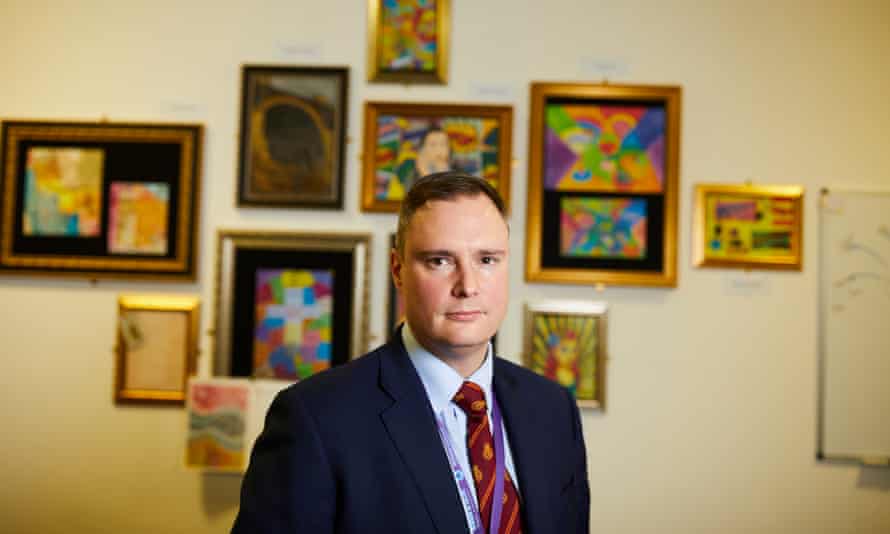Of the 1,200 pupils who should have been in school at Newman Roman Catholic college in Oldham on Friday, only half were at their desks. In the last three weeks, there have been 33 positive Covid cases among pupils and the speed at which the virus is spreading is picking up, but the overwhelming majority of children who are at home are not ill. They are self-isolating.
Newman is among the worst affected schools in the borough, where there is an infection rate of 460 for every 100,000 people (compared with a national average of 172). Overall figures for Oldham showed there were 6,245 children self-isolating on Friday – 14% of the school-age population – up from 4,109 nine days earlier. With 400 staff and a total of 199 bubbles now off, some schools are struggling to remain open.
If it was up to headteacher Glyn Potts, all his pupils – 41% of whom come from disadvantaged backgrounds – would be in school, apart from those who have Covid.
Close contacts in class, on the school bus, over lunch, would be tested regularly and sent home if positive, but until that point they would remain on site where he knows they are safe and they are learning. It’s an approach the government has been trying out as part of a pilot – early feedback is positive, but final results are still some way off.
On the other side of Manchester, at St Ambrose Barlow Roman Catholic high school in Swinton, headteacher Ben Davis has had 40 cases in the past three weeks, and has 191 pupils at home self-isolating. Last Friday it was over 300, more than a third of pupils. Every day he sends a letter to parents updating them on how many cases, who’s in, who’s out.
It’s getting increasingly complicated and some parents are getting frustrated. Thursday’s letter read: “9B + 4 pupils from IT class come out of isolation on 4 July and return to school on Monday 5 July. 15 year 10 pupils come out of isolation on 3 July, return to school on 5 July. Some will return on Friday 2 July and this has been communicated to the relevant pupils by letter. 9J come out of isolation on 4 July and return to school on the 5th. 9C come out of isolation on 5 July and return on that day. 8M + 6 pupils come out of isolation and return to school on Tuesday 6 July. 8C + 7 other pupils come out of isolation on Sunday 11 July and return to school on Monday 12 July.”

The government said this week it would like to scrap isolation bubbles in schools because they were causing too much disruption and too many children who were perfectly healthy were losing face-to-face learning. According to the latest government data this week, 375,000 pupils were off school in England – a 400% rise in the past month.
Davis agreed it was frustrating to have to send “bubbles” of children home for 10 days following a single positive case, but said it made sense because very often other positive cases subsequently emerged from the same bubble. It also made remote education more effective, so teachers can focus on the entire class, rather than splitting attention between children in school and those at home.
“The logic of bubbles makes sense,” said Davis. “If they are going to get rid of bubbles next week, that feels extremely precipitous and very reckless. My reservation about saying bubbles should go – and in many respects I would like to see that happen – is that something else protective has to be in place in schools instead.
“If it’s not in place, really what we are saying is we are prepared to put children and the education workforce at greater risk. We are still seeing high levels of infection and we don’t know what September is going to be like.” If mass testing is to be introduced, he said, schools need plenty of warning and time to prepare.
It’s just three weeks until the end of the summer term, but Potts wants to see change now. Potts has not sent an entire year group bubble (300 pupils) home since February, but tracing every close contact means self-isolation numbers build up. “I take real offence at the comment that schools are perhaps being too eager to send children home, absolutely the opposite is true.

“I can’t write off the next three weeks. My kids desperately need these three weeks.” Many of his pupils are vulnerable and he worries about them falling prey to gangs and county lines. “We had a young boy cry yesterday. He said, ‘It’s my third time sir, it’s my third time’.”
Potts breaks off, sounding close to tears. He apologises then resumes: “‘It’s my third time being sent out sir. I don’t want to go home. I’m lonely’.
“Out there you put a stiff upper lip on and you say: ‘I’m sorry son, you are going to have to go home. It’s about keeping you safe’. But simply to stick to the rules that were in place last March seems to me not to have evolved with the vaccine rollout or indeed our own knowledge of how it works in terms of the virus.”
It’s a beautiful, sunny day in Oldham when we speak. “We very rarely get sun,” said Potts, who admits that despite all the checks he and his staff make on pupils who are out of school self-isolating, he can’t guarantee that they’re all at home all of the time. “I wouldn’t be surprised if some of them haven’t gone to the park or whatever because it’s human nature. Surely having them in school would be better?”
Stay connected with us on social media platform for instant update click here to join our Twitter, & Facebook
We are now on Telegram. Click here to join our channel (@TechiUpdate) and stay updated with the latest Technology headlines.
For all the latest Education News Click Here
For the latest news and updates, follow us on Google News.
